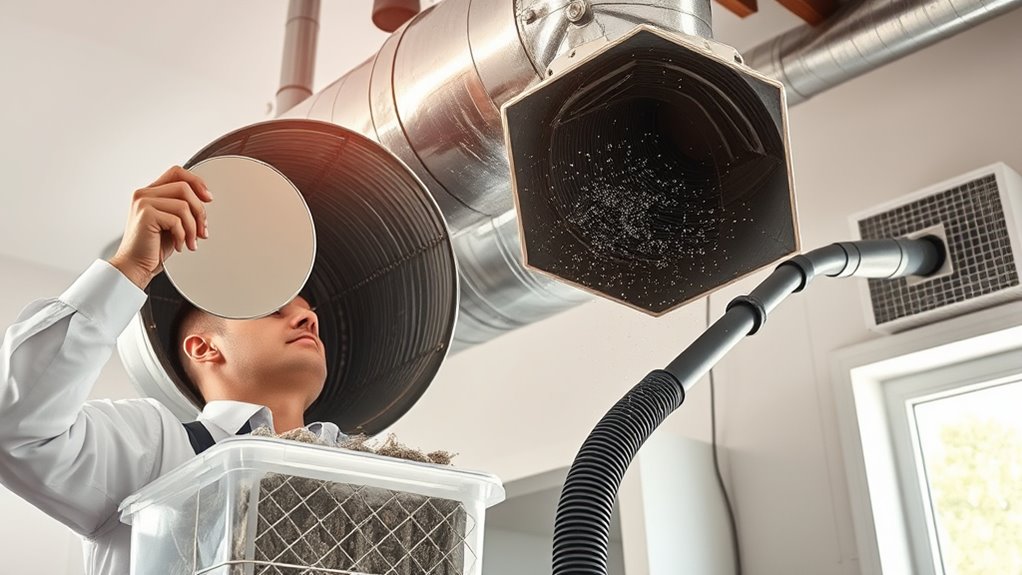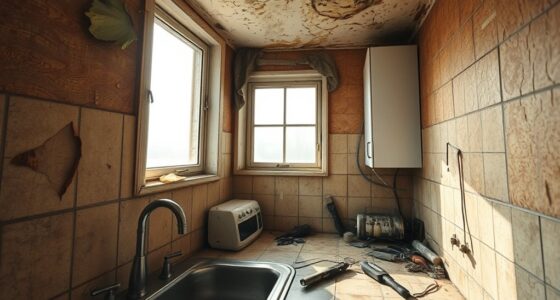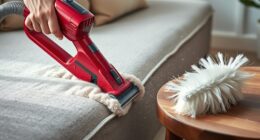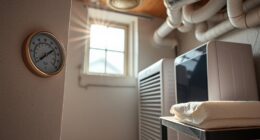To keep your HVAC system running smoothly, you should regularly clean or replace filters every 1 to 3 months, especially during peak seasons. Inspect your ducts for dust, debris, or mold, and seal any leaks to improve airflow. Cleaning vents helps reduce allergens and enhances efficiency. Neglecting these tasks can lead to higher energy bills and system problems. Stay with us to uncover more tips for maintaining your system and ensuring better air quality.
Key Takeaways
- Regularly check and replace filters every 1 to 3 months to ensure optimal system performance and indoor air quality.
- Inspect ducts periodically for dust, debris, mold, and leaks to maintain efficient airflow and prevent contamination.
- Schedule professional duct cleaning and repairs every few years to eliminate blockages and improve HVAC efficiency.
- Clean filters, vents, and registers to reduce strain on the system and improve indoor air cleanliness.
- Neglecting maintenance can lead to decreased efficiency, higher energy bills, and increased risk of costly repairs.
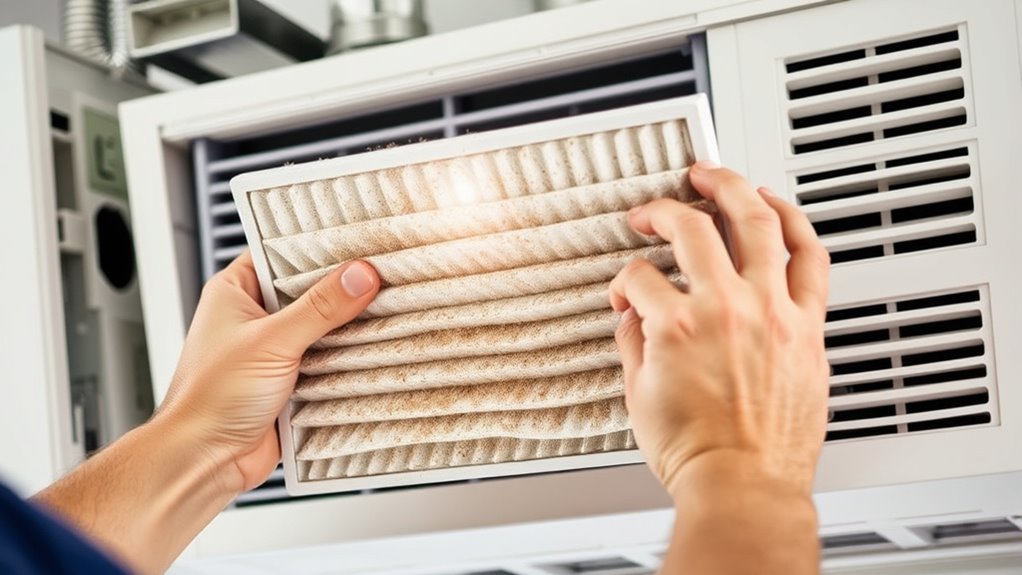
Have you ever wondered how to keep your HVAC system running smoothly all year round? One of the most critical steps is regular maintenance, especially focusing on filter replacement and duct inspection. These simple tasks can markedly improve your system’s efficiency, prolong its lifespan, and ensure better indoor air quality. When you replace your filters regularly, you prevent dust, dirt, and allergens from circulating throughout your home, which not only keeps the air cleaner but also reduces strain on your HVAC components. A dirty filter forces your system to work harder, consuming more energy and potentially causing premature wear. So, make it a habit to check your filters monthly, especially during peak usage seasons, and replace them as needed—typically every 1 to 3 months, depending on usage and filter type.
Alongside filter replacement, duct inspection plays an essential role in maintaining your HVAC system. Over time, dust, debris, and even pests can accumulate inside your ductwork, leading to reduced airflow and decreased system efficiency. During duct inspection, look for signs of mold, leaks, or damage. Leaky ducts can cause conditioned air to escape before reaching its destination, wasting energy and increasing your utility bills. Sealing leaks and repairing damaged sections ensures your system operates at peak performance. Additionally, inspecting your ducts allows you to identify any blockages or buildup that could hinder airflow, making your system work harder than necessary. Consider scheduling professional duct cleaning every few years, especially if you notice inconsistent heating or cooling, increased dust, or allergy symptoms.
Neglecting these maintenance tasks can result in a cascade of issues. Poor airflow, increased energy costs, and reduced indoor air quality are common consequences of skipped filter replacements and duct inspections. By staying proactive, you help your HVAC system run more efficiently, enjoy cleaner air, and extend its overall lifespan. Remember, maintaining your system isn’t just about fixing things when they break; it’s about consistent care and attention. Simple actions like swapping out filters regularly and inspecting your ductwork can save you money in the long run and keep your home comfortable year-round. So, set reminders, keep a maintenance schedule, and don’t overlook these essential steps—they’re the key to a well-functioning HVAC system that serves you reliably season after season.
Frequently Asked Questions
How Often Should I Replace My HVAC Filters?
You should replace your HVAC filters every 1 to 3 months, depending on the filter lifespan and your home’s needs. If you have pets, allergies, or live in a dusty area, consider replacing filters more frequently. Regular replacement improves air quality and system efficiency. Monitor your filter’s condition monthly, and change it when it looks dirty or clogged to maintain peak airflow and prevent strain on your HVAC system.
Can I Clean My Ducts Myself?
Yes, you can do DIY cleaning of your ducts, but it’s important to start with a thorough duct inspection first. Use a flashlight to check for dust, debris, or mold. Carefully remove access panels and use a vacuum with a hose attachment to clean inside. Be cautious, and if you notice mold or heavy buildup, consider hiring a professional. Regular DIY cleaning helps maintain airflow and indoor air quality.
What Are Signs of a Clogged Vent?
Think of your vent as a garden hose – when it’s clogged, water struggles to flow. You’ll notice airflow restriction, feeling like your room isn’t as cool or warm as it should be. Persistent dust, musty odors, or mold growth around vents are clear signs. If your vents seem less effective, it’s time to check for blockages, as these issues can cause mold and compromise your indoor air quality.
Does Cleaning Improve HVAC Energy Efficiency?
Yes, cleaning your HVAC system improves energy savings by enhancing filter performance and airflow. When filters are clean, your system doesn’t have to work as hard, reducing energy consumption and lowering utility bills. Regular cleaning of filters, ducts, and vents ensures efficient operation, prolongs equipment lifespan, and maintains consistent indoor comfort. So, make it a habit to keep your HVAC components clean for maximum energy efficiency.
When Should I Call a Professional for Maintenance?
Did you know neglecting HVAC maintenance can increase energy bills by up to 30%? You should call a professional when DIY tips aren’t enough—like persistent strange noises, poor airflow, or system breakdowns. Although regular cleaning saves money, some tasks, like duct inspections, cost more if done improperly. Professional maintenance guarantees your system runs efficiently, saving you money long-term. Don’t wait until small issues become costly repairs.
Conclusion
To keep your HVAC system running smoothly, remember to clean your filters, ducts, and vents regularly. Regular maintenance guarantees better air quality, improves efficiency, and extends the lifespan of your system. Keep your home comfortable, your energy bills low, and your system in top shape by staying proactive. Clean filters, clear ducts, and open vents—your HVAC’s best friends. Stay consistent, stay attentive, and enjoy a healthier, more comfortable home all year round.
